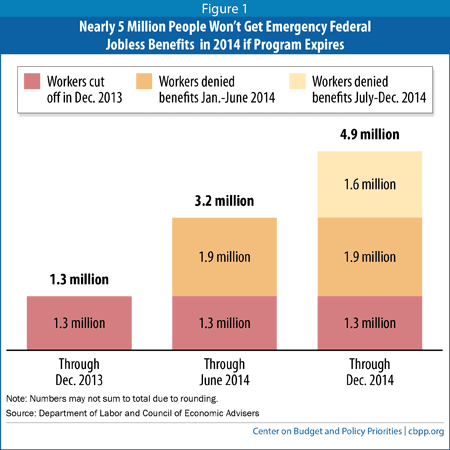- Home
- Failure To Extend Emergency Unemployment...
Failure to Extend Emergency Unemployment Benefits Will Hurt Jobless Workers in Every State
Nearly 5 Million Expected to Lose Out on Benefits in Next 12 Months
A needed extension of federal emergency jobless benefits was absent from this week’s budget agreement, potentially leaving almost 5 million jobless workers in the lurch over the next 12 months, according to Department of Labor estimates.[1] Failure to extend the Emergency Unemployment Compensation (EUC) program would affect jobless workers in every state.
As Figure 1[2] shows:
- An estimated 1.3 million jobless workers now receiving EUC will receive no benefits after Christmas week if the program expires as scheduled.
- An estimated 1.9 million people receiving regular state unemployment insurance (UI) payments, which typically run for a maximum of six months, will exhaust them in the first half of 2014 before they can find a job. If EUC expires, these workers will receive no further benefits.
- An estimated 1.6 million people who lose their jobs in the first half of 2014 will exhaust their regular state UI in the second half of the year before they can find a job. If EUC expires, these workers will receive no further benefits.
In all, an estimated 4.9 million workers would lose out on EUC benefits by the end of 2014.

Emergency federal UI programs like EUC are designed to phase down as the labor market improves and eventually expire. The phasing down is underway — the maximum number of weeks of EUC plus regular UI has fallen from 99 to 73, and that maximum is available in only a handful of states — but it is too soon to let the program expire.
While the unemployment rate has fallen from its recession peak to 7.0 percent, this measure alone provides too optimistic a picture of the overall health of the labor market:[3]
- The share of the population with a job, which plunged in the recession to levels last seen in the 1980s, has changed little in the ensuing four years. The recession drove many people out of the labor force, and lack of job opportunities in the ongoing jobs slump has kept many potential jobseekers on the sidelines. Many of these people would like to work and, in a stronger labor market, they would likely have a job or at least be looking, but they are not looking actively enough to be counted as officially unemployed. Their absence from the ranks of the officially unemployed keeps the unemployment rate lower than it otherwise would be.
- Long-term unemployment remains a significant concern. Nearly two-fifths (37.3 percent) of the 10.9 million people who are unemployed — 4.1 million people — have been looking for work for 27 weeks or longer. These long-term unemployed represent 2.6 percent of the labor force. At 2.6 percent, the long-term unemployment rate is at least twice as high as when any of the emergency federal UI programs that policymakers enacted in each of the previous seven major recessions expired.
Table 1 shows the Department of Labor’s estimates of the number of people in each state that would be affected over the next 12 months if EUC is allowed to expire. In 11 states, more than 100,000 people would lose access to benefits.
On Emergency Jobless Benefits, Don’t Be Fooled by November’s Drop in Unemployment
End Notes
[1] The Council of Economic Advisers and the Department of Labor, “The Economic Benefits of Extending Unemployment Insurance,” December 2013, Figure 7, p. 18, http://www.whitehouse.gov/sites/default/files/docs/uireport-2013-12-4.pdf.
[2] Adapted from the Council of Economic Advisers and Department of Labor report.
[3] Chad Stone, “On Emergency Jobless Benefits, Don’t Be Fooled by November’s Drop in Unemployment,” Off the Charts blog, Center on Budget and Policy Priorities, December 10, 2013, http://www.offthechartsblog.org/on-emergency-jobless-benefits-dont-be-fooled-by-novembers-drop-in-unemployment/.
